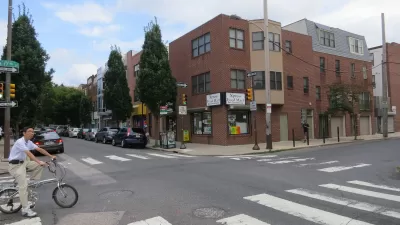Recently approved laws that force cities to take a more proactive approach to the state-mandated Regional Housing Needs Assessment process are beginning to take effect in California.

A detailed article by Benjamin Schneider digs into the changes occurring in California's Regional Housing Needs Assessment (RHNA) process as a result of Senate Bill 828, authored by State Senator Scott Wiener and approved by the California State Legislature in 2018—as part of a package of "housing first" bills that included the more closely monitored, but eventually failed, Senate Bill 827.
"The law beefs up the methodology used to determine each region’s housing allocation, accounting for previous under-production of housing, as well as areas where home prices are rising faster than wages, among other considerations," according to Schneider's explanation.
As a result, the Association of Bay Area Governments (ABAG), working with planners from the Metropolitan Transportation Commission (MTC), must now plan for a doubling of allocated housing for this cycle of the RHNA process.
"Of the Bay Area’s allocation, 26 percent of new homes must be for very low income households, 15 percent for low income, 17 percent for moderate income, and 42 percent for above moderate income," explains Schneider of the allocation announced in June 2020.
ABAG adopted their plan for addressing that allocation on January 21, 2021, reports Schneider, but official certification awaits state approval and likely litigation from the cities responsible for the local plans and zoning changes that will work toward accomplishing the prescribed changes. San Francisco, for example, "needs to plan for a 22 percent increase in households, or 82 thousand more units, between 2023 and 2031. That’s up from an allocation of about 29 thousand homes during the 2014-22 cycle," writes Schneider.
Illustrations of how the housing allocation breaks down around the Bay Area, provided by the MTC, are included in the article, in addition to a lot more details on the plan approved by ABAG earlier this month.
The RHNA methodology has been a source significant political controversy in the state in recent months. A study by the Embarcadero Institute tried to poke holes in the methodology earlier this year. An article recently shared by Planetizen showed how some wealthy cities, Newport Beach in Orange County in this example, but Beverly Hills and Pasadena offer other famous examples, have managed to avoid large allocations through the RHNA process in the past.
FULL STORY: Bay Area Takes Step Toward Major Housing Growth

Trump Administration Could Effectively End Housing Voucher Program
Federal officials are eyeing major cuts to the Section 8 program that helps millions of low-income households pay rent.

Planetizen Federal Action Tracker
A weekly monitor of how Trump’s orders and actions are impacting planners and planning in America.

Ken Jennings Launches Transit Web Series
The Jeopardy champ wants you to ride public transit.

Washington Legislature Passes Rent Increase Cap
A bill that caps rent increases at 7 percent plus inflation is headed to the governor’s desk.

From Planning to Action: How LA County Is Rethinking Climate Resilience
Chief Sustainability Officer Rita Kampalath outlines the County’s shift from planning to implementation in its climate resilience efforts, emphasizing cross-departmental coordination, updated recovery strategies, and the need for flexible funding.

New Mexico Aging Department Commits to Helping Seniors Age ‘In Place’ and ‘Autonomously’ in New Draft Plan
As New Mexico’s population of seniors continues to grow, the state’s aging department is proposing expanded initiatives to help seniors maintain their autonomy while also supporting family caregivers.
Urban Design for Planners 1: Software Tools
This six-course series explores essential urban design concepts using open source software and equips planners with the tools they need to participate fully in the urban design process.
Planning for Universal Design
Learn the tools for implementing Universal Design in planning regulations.
Heyer Gruel & Associates PA
Ada County Highway District
Institute for Housing and Urban Development Studies (IHS)
City of Grandview
Harvard GSD Executive Education
Toledo-Lucas County Plan Commissions
Salt Lake City
NYU Wagner Graduate School of Public Service





























